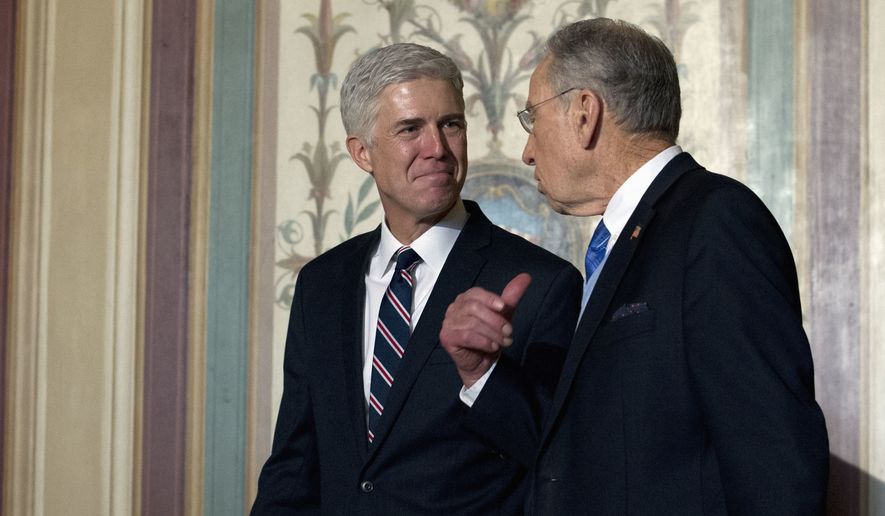ANALYSIS/OPINION:
By any measure, President Trump hit a grand slam with his Supreme Court nomination.
The process he undertook was the most transparent in history. He pledged to choose a nominee from a list he released publicly, and he did. He consulted widely respected experts such as Leonard Leo of the Federalist Society and listened to Vice President Mike Pence and Capitol Hill leaders.
Among conservative Trump critics, I can find zero concern or opposition to Judge Neil M. Gorsuch, and even some Democrats are praising the pick.
Neal Katyal, who was acting solicitor general under President Obama, endorsed the Colorado judge Tuesday in a New York Times opinion piece.
Replacing the late conservative Justice Antonin Scalia with another conservative does not fundamentally alter the balance of the court. It will remain a narrow 5-4 conservative-leaning majority on most issues, with Justice Anthony M. Kennedy serving as a swing vote.
AUDIO: Roger Stone and Joe Trippi with Matt Mackowiak
Democrats have been collectively beating their chests for months, promising to block any Trump Supreme Court nominee, no matter who it is.
I understand that the left is angry that Republicans successfully held out until voters cast their national ballots in November before acting on Justice Scalia’s replacement. And, candidly, there has been hypocrisy on both sides in this debate.
Democrats argued all last year that a 4-4 high court was undemocratic and a threat to our nation. Now they want to keep the seat vacant in perpetuity.
Republicans argued that Mr. Obama’s Supreme Court pick, the respected Judge Merrick Garland, should not receive a hearing or a floor vote in the final months of a presidency and in the midst of a contentious presidential election. They are now demanding a floor vote on Judge Gorsuch.
Despite threats of primary challenges from liberals like filmmaker Michael Moore, Democrats are seeing the writing on the wall. In 2007, Judge Gorsuch was confirmed for his federal judgeship by the narrow margin of 95-0 in the Senate. If he was as extreme as hard-core leftists claim, then why did dozens of Democrats vote for him?
Indeed, the 60-vote threshold for Supreme Court nominees remains in the U.S. Senate, and this is a good thing. It forces presidents to select highly qualified, smart, articulate and vetted nominees for lifetime appointments to the highest court in the land.
In the hours immediately following the nomination, seven Democratic senators — Richard Blumenthal of Connecticut, Christopher A. Coons of Delaware, Heidi Heitkamp of North Dakota, Joe Manchin III of West Virginia, Claire McCaskill of Missouri, Jon Tester of Montana and Richard J. Durbin of Illinois — announced they would not join a filibuster of Judge Gorsuch. At least four of those seven are vulnerable incumbents up for re-election next year, running in states that Mr. Trump won just two months ago.
With the Senate’s 52 Republicans all lining up behind the judge, remedial mathematics tells us that President Trump already is just one vote away from the 60 votes he needs to confirm Judge Gorsuch.
In making this nomination, we are seeing a playbook for the Trump administration that offers a path to success: Undertake a serious, transparent process, engage stakeholders and the minority party, vet your decision, meticulously prepare your rollout plan and execute. Repeat. In unveiling his choice Tuesday night, Mr. Trump appeared presidential — calm, deliberative, confident and prepared.
The real battle will likely be the next Supreme Court vacancy, which most expect within the next two years.
This is precisely why preserving the filibuster is so important for the Senate’s Republican leadership. Ending the filibuster is a bullet you can fire only once.
Now is not the time to pull the trigger, when you already have 59 votes, a qualified nominee and time on your side. Better to wait until a liberal justice dies or steps down, when the balance of the court is at stake.
This situation could present itself perhaps within this calendar year, and the battle on Capitol Hill will be as fierce as any we have ever seen. In already surrendering to political reality, (some) Senate Democrats are showing they understand that fighting a losing battle is no way to help their 25 colleagues facing voters next year.
Re-election is 22 months away, and the clock is ticking.
Tick-tock. Tick-tock.
• Matt Mackowiak is the president of Potomac Strategy Group, a Republican consultant, a Bush administration and Bush-Cheney re-election campaign veteran, and former press secretary to two U.S. senators. He is the host of a national politics podcast, “Mack on Politics,” produced in partnership with The Washington Times. His podcast may be found at washingtontimes.com/mackonpolitics.
• Matt Mackowiak can be reached at 654321@example.com.




Please read our comment policy before commenting.